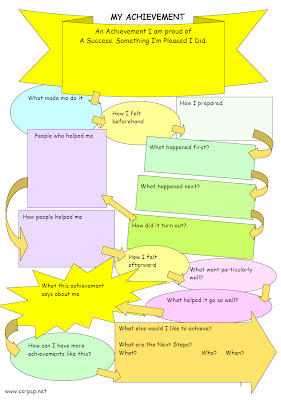The achievement tool has a few purposes.
The first is simply to make a record of something that we're very proud to have accomplished.
The second is to celebrate that accomplishment.
 |
| Our achievements tell us so much about ourselves. To find out more about the Achievement Tool, pleas click on the picture. |
The third is to draw out learning from what we have achieved: learning about what it is that helps us achieve.
I've used this tool many times over the last few years since I first designed it in a burst of creativity stimulated by Gill Bailey and Helen Sanderson's training, and by my own research into AI.I realised how powerful this tool was the very first time I used it with a group. Several members of the group were shedding tears as they told their achievement stories. The whole group felt we were entering important and fertile territory for inquiry, and were able to express so much appreciation for each person after they had told their story. As each story unfolded, the energy in the room grew increasingly hopeful and postive, people left feeling genuine connection with each other and a sense of personal empowerment.
Talking about our achievements is not always easy for people from the English culture. We don't like to 'blow our own trumpets'. But when we do, we go very deep into who we are, what drives us, some of our very deepest feelings.
Appreciative Inquiry is based on the idea that what we inquire into expands. If we inquire into a person's faults and deficits, we will continue to find more and more, until the picture we have painted of them becomes positively debilitating. If we inquire into a person's achievements, we learn more and more about what helps that person achieve, and potentially enable that person to achieve more and more.
The Achievement Tool links directly to other person centred thinking tools.
For example, the question 'What made me do it?' links directly to what is most important to us.
Sometimes people use the tool to tell stories of how they have overcome adversity such as leaving a long term partner, or overcoming a situation that has been thrust upon them. Sometimes it is an achievement of something that they have chosen to attempt. In either case it can help us understand our own key priorities.
'People who helped me' helps us learn more about our real circle of support: the people who are around when we are achieving things, rather than the people who somehow hold us back.
'How people helped me' and 'What helped it go so well?' give us clues about what makes good support for us. If we can recreate the conditions that existed last time we achieved something great, perhaps we can go on to achieve more!
'What this achievement says about me' explores the capacities that the achievement reveals within us. I like to call it like and admire, but with an evidence base.
There's a number of ways to use the tool. It can be used with individuals, teams and even with whole organisations. Even if the only achievement your team can think of is that they organised a really good leaving do for a colleague, the learning from that can give clues about talents and skills within the team that could be applied to the core work of the organisation.
I tend to start by asking everyone in a group to think of something they have achieved. It could be big or small, and I point out that this is not an 'achievement competition'. We can often learn just as much useful information from a small achievement like baking a cake as we do from a major life-changing achievement.
When everyone has mentioned what their achievement is, I ask for volunteers to explore their achievement more deeply. It works to split people into groups of 3, one person to talk more about their achievement, one to ask them questions, and one to record the answers in a way that makes sense.
When people have recorded their achievement, they go back to the whole group and are helped to recount their achievement story. Each story ends with a round where everyone in the group tells the person what they appreciate about them and their achievement.
It's a great way to end a training session so that everyone feels on a high, ready to go out and achieve more!
A lot of organisations are finding it hard to talk to social care commissioners in the language of outcomes, rather than inputs. Using the achievement tool with people we support gives us a real picture of what people feel are the real achievements and outcomes in their own lives. People have used the tool to describe how they gave up smoking, how they recruited their own staff members, how they made new friends, how they used a train independently for the first time.
Teams have used the tool to celebrate winning new tenders, supporting a person to successfully lose weight, in a way that made sense to them, and helping a person whose previous support arrangements had repeatedly broken down to build a successful life in the community.
Here's what Amanda George thinks of the Achievement Tool.
What achievements do you feel proud of? Have you explored what motivated you, and helped you accomplish them? What else could you achieve if you really paid attention to what helps you be at your strongest and best?
Casino Finder (WG98) - Find Casinos Near You
ReplyDeleteGet directions, reviews 정읍 출장마사지 and 오산 출장샵 information 김해 출장안마 for Casino Finder 전주 출장샵 (WG98) in Wazala, Wazala, 과천 출장마사지 Wazala.